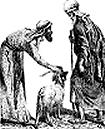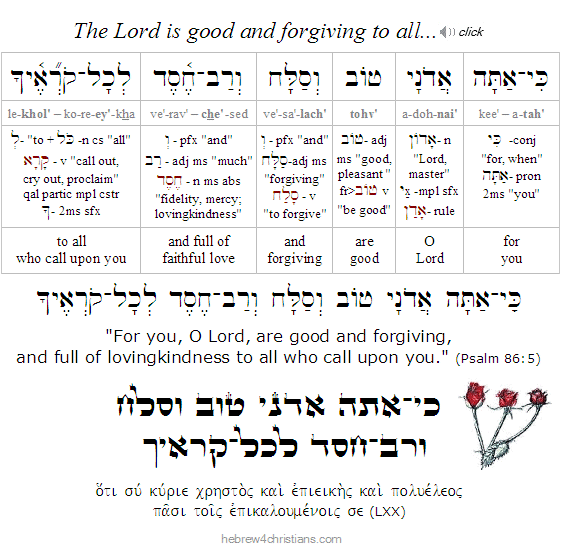Adonai Tov ve'Salach
The Lord is good and forgiving
For You, O Lord, are good and forgiving,
and full of lovingkindness to all who call upon thee. – Psalm 86:5

ith all of the evil in the world, how can we be sure that God is good? The skeptical mind reasons that if God were entirely good and all-powerful, then He would surely
make all of His creatures happy. However, since we all experience pain and suffering, His goodness may be rightly questioned.
Learn Hebrew
Of course this way of thinking is too simplistic, since it assumes that human happiness (usually understood as pleasure) is the goal of life, whereas the Scriptures make clear that a relationship with a holy God is its true end. God's role is not therefore to make us all "happy," but rather to make us fit for relationship with Him, and He often allows suffering in our lives to teach us the truth about our condition. The goodness of God does not in any way imply that He must create well-pleased creatures who are oblivious of their relationship with the truth.
Ironically, many who impugn the goodness of God often don't want anything to do with the responsibility to be morally good themselves. For the skeptic, goodness is fobbed off as God's responsibility to please man, rather than man's responsibility to please God. The voice of conscience that reveals the "categorical imperative" to always do what we (intuitively) know is right must therefore be suppressed, and the self becomes divided, at war within, and fragmented. If we do not realize this, it is because we are asleep or morally deadened; however, the moment we awaken and become alive, life itself becomes tragic. As the Apostle Paul said, "I was alive without the law once: but when the commandment came, sin revived, and I died" (Rom. 7:9).
The goodness of God, then, poses a problem for sinful people, since it reveals their alienation from the truth and implies that God is inaccessible to them on account of His perfect righteousness and holiness. The morally perfect Lord cannot tolerate the presence of injustice or evil of any kind, and therefore those who violate His perfect moral standards must be subject to the verdict of truth from Him.
But can God forgive sin and restore the sinner from this state of exile?
The Hebrew word translated "forgive" is salach, which (like the verb bara, to create) is used exclusively of God. Since God is the giver of life, sins committed against others are regarded as offenses against God Himself. As we do unto others, we do unto the Lord. Therefore it is God's prerogative to forgive, since ultimately He is the offended party.
In the Torah, God instituted the sacrificial system as a means of reconciliation with Him for human sinfulness. The law of Moses taught that when a person sinned against the Lord, he or she was under sentence of death. Satan, the accuser, would come before God and make a case for the person's neshamah (soul). To appease the required judgment, however, God mercifully accepted the death of a sacrificial victim in place of the sinner.
The guilty person would come before the Lord (at the mishkan or Tabernacle), lean his hands upon the head of the sacrificial animal (semichah), and then say viduy (confession): "I deserve to die instead of this blameless animal, but You mercifully accept the death of this innocent one in my stead." When God saw the shed blood or ascending smoke of the sacrifice, he would forgive the sinner based on his faith and teshuvah (repentance).

Of course the Levitical system of animal sacrifices, including the elaborate Yom Kippur ritual, was only temporarily efficacious, being subject to the frailty of human flesh. But God, in His infinite love and grace, bypassed the weakness of human flesh by taking its place as the perfect sacrificial victim for our sins (Rom. 8:3-4). The death of Jesus is the means of securing our eternal reconciliation with God by providing an infinitely worthy restitution to an infinitely just and holy God. The good news is that justice and mercy have kissed, and because of Jesus' sacrifice we can now call upon the Lord who is rav chesed (abounding in steadfast love) toward us.

Chesed-ve'emet nifgashu, tzedek veshalom nashaku.
Steadfast love and truth meet; righteousness and peace
kiss each other. Psalm 85:10
Have you personally made semichah by leaning your hands on Jesus as your perfect sacrifice for sin? Have you made viduy (confession) of your sin and expressed your need for deliverance through Him? God is indeed good and ready to forgive, and His love abounds toward all those who call upon His Name for salvation.
Hebrew Lesson
Psalm 86:5 reading (click):

- Psalm 86:5 Hebrew page (pdf)
Hebrew for Christians
Copyright © John J. Parsons
All rights reserved.